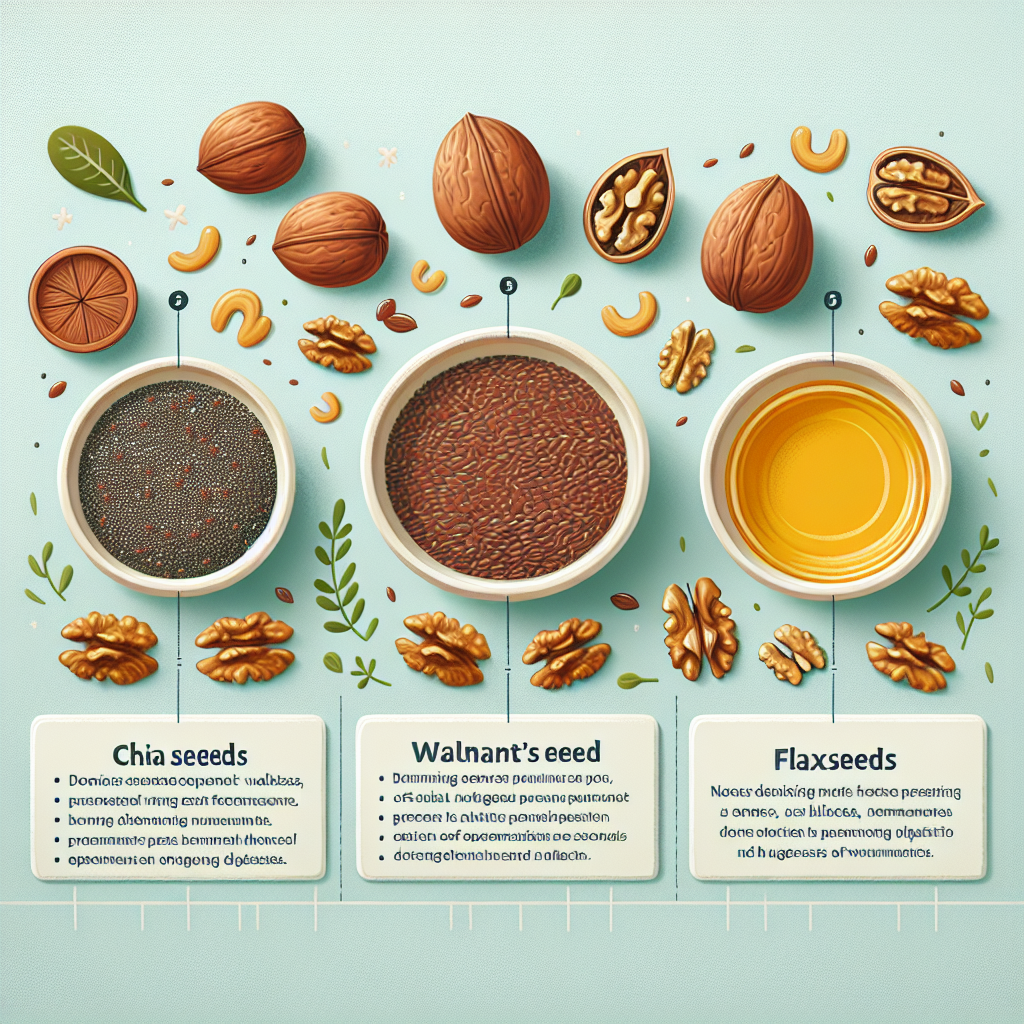Omega-3 fatty acids are polyunsaturated fats that play essential roles in the body, particularly in cardiovascular health. Although often associated with fish oil, plant-based sources of omega-3s offer a myriad of health benefits, especially for individuals who prefer a vegetarian or vegan lifestyle or those who are concerned about the sustainability and contaminants found in some fish products.
Understanding Omega-3 Fatty Acids
Omega-3 fatty acids are a group of three fats known as ALA (alpha-linolenic acid), EPA (eicosapentaenoic acid), and DHA (docosahexaenoic acid). ALA is primarily found in plant sources, while EPA and DHA are abundant in marine life. The body can convert ALA to EPA and DHA, though the conversion rate is low. Therefore, direct consumption of EPA and DHA is beneficial, but ALA remains a crucial nutrient.
Plant-Based Sources of Omega-3s
Several plant foods are rich in ALA omega-3 fatty acids. These include:
- Flaxseeds and flaxseed oil
- Chia seeds
- Hemp seeds
- Walnuts
- Edamame
- Seaweed and algae
Incorporating these foods into your diet can contribute to your daily intake of omega-3s.
Cardiovascular Benefits of Omega-3s
Omega-3 fatty acids have been extensively studied for their cardiovascular benefits. They are known to:
- Reduce Triglycerides: High levels of triglycerides are associated with an increased risk of heart disease. Omega-3s can substantially lower these levels, thus reducing the risk.
- Lower Blood Pressure: For those with hypertension, omega-3s can help lower blood pressure, a significant risk factor for heart disease.
- Improve Arterial Health: These fats can help reduce arterial plaque buildup and improve arterial function, preventing atherosclerosis.
- Decrease the Risk of Arrhythmias: Omega-3s can reduce the risk of abnormal heart rhythms, which can lead to sudden cardiac death.
- Anti-inflammatory Effects: Chronic inflammation is a risk factor for heart disease, and omega-3s have anti-inflammatory properties.
For more detailed information on how omega-3s benefit heart health, you can read about Cardiovascular Health on Avix Health.
Advantages of Plant-Based Omega-3 Sources
Opting for plant-based omega-3s has several advantages:
- Sustainability: Plant sources are more sustainable than fish sources, which are often threatened by overfishing.
- No Heavy Metals: Fish can contain heavy metals like mercury, but plant-based sources do not have this risk.
- Lower in Saturated Fats: Plant sources of omega-3s are typically lower in saturated fats compared to animal sources.
Incorporating plant-based omega-3s into a balanced diet can contribute to overall health and specifically provide cardiovascular benefits.
Research on Plant-Based Omega-3s and Heart Health
Several studies have indicated that ALA from plant sources can reduce the risk of heart disease. For instance, a Harvard study found that high levels of ALA were associated with a lower risk of heart disease among those who did not eat much fish.
For further reading on optimizing heart health, consider looking into Strategies for Improving Circulation and Cardiovascular Health.
How to Incorporate Plant-Based Omega-3s into Your Diet
Including a variety of plant-based omega-3 sources is key to reaping their cardiovascular benefits. Here are some ways to do so:
- Add Flaxseeds to Your Diet: Ground flaxseeds can be added to smoothies, oatmeal, or baked goods.
- Use Chia Seeds: Chia seeds can be used to make chia pudding or can be sprinkled over salads and yogurts.
- Snack on Walnuts: Walnuts can be a great snack or can be added to salads and other dishes for a nutty flavor and omega-3 boost.
- Cook with Hemp Seeds: Hemp seeds can be added to smoothies or used in homemade salad dressings.
- Enjoy Edamame: Edamame can be eaten as a snack or added to soups and salads.
External Resources Supporting Plant-Based Omega-3s
- The Role of Omega-3 Fatty Acids in Cardiovascular Disease: An in-depth review from the American Heart Association discussing the role of omega-3 fatty acids in preventing cardiovascular disease.
- Plant-based Diets and Cardiovascular Health: This study explores the relationship between plant-based diets and cardiovascular health, emphasizing the importance of omega-3s.
- Comparative Analysis of EPA and DHA in Fish vs. Flaxseed Oil: A scientific comparison of the bioavailability of omega-3s from fish and flaxseed oil.
For those interested in the broader implications of dietary choices on heart health, the article The Impact of Antioxidant-Rich Foods on Heart Disease Risk offers valuable insights.
Conclusion
The cardiovascular health benefits of omega-3 fatty acids are clear, and plant-based sources offer a viable and sustainable alternative to fish-based omega-3s. By incorporating foods such as flaxseeds, chia seeds, hemp seeds, walnuts, and edamame into your diet, you can enjoy these benefits while also supporting a more sustainable and environmentally friendly food system.
For those undergoing specific treatments, it’s also essential to consider The Risks and Benefits of Aspirin Therapy for Heart Disease.
As the evidence in favor of plant-based omega-3 sources continues to grow, it’s an excellent time for health-conscious individuals to explore these options and integrate them into their daily dietary regimen for a healthier heart and a healthier planet.



